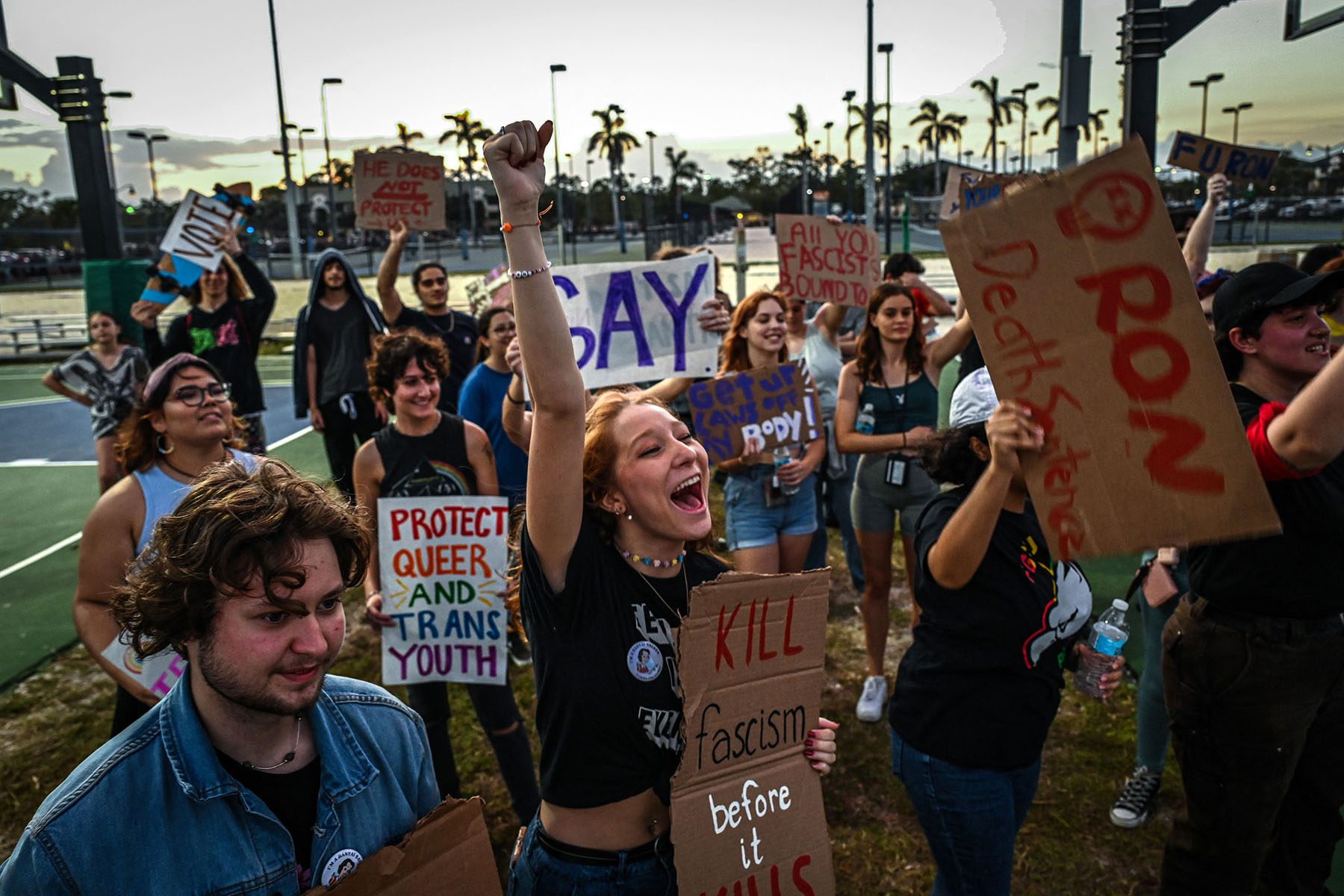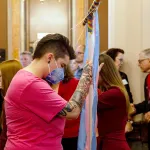The numbers say what headlines haven’t: Anti-LGBTQ+ rhetoric carries little weight with voters, even if the talking points make a lot of noise. That’s one of the takeaways experts and advocates are reaching after a lukewarm showing by far-right Republicans during the midterms.
Anti-trans candidates fumbled in many elections, and those who succeeded may have won on other issues, advocates say. Meanwhile, LGBTQ+ candidates won in historic numbers despite an onslaught of homophobic and transphobic attacks.
“I think that conservative politicians are betting that going after LGBT people, and especially trans people, is motivating voters,” said Rodrigo Heng-Lehtinen, executive director of the National Center for Transgender Equality Action Fund. “But I think that this election showed that it is only motivating to the most extremist voters.”
Numbers support Heng-Lehtinen’s claims. According to exit polling from LGBTQ+ advocacy organization the Human Rights Campaign and data analytics firm Catalyst, voters ranked LGBTQ+ issues as low on their list of priorities for 2022. More than half (52 percent) chose inflation, and 29 percent picked abortion. Transgender health care and participation in sports came in last on the list of issues with just 5 percent.
Those numbers come after three years of nearly ceaseless legislation in statehouses across the country targeting transgender youth. In the last year alone, 344 anti-transgender bills were introduced in statehouses, and 25 became law, according to the Human Rights Campaign.
Nowhere has the anti-trans push been stronger than in Texas, where Gov. Greg Abbott directed officials to investigate parents of transgender kids getting gender-affirming medical care, or in Florida, where Gov. Ron DeSantis championed a bill barring schools from teaching about sexual orientation or gender identity.
While both incumbents won their reelection bids, advocates say their victories do not necessarily signal a fever pitch of anti-transgender animus in the country.
In Illinois, Republican gubernatorial candidate Darren Bailey called gender-affirming care “experimental surgeries.” In Nevada, Republican attorney general candidate Sigal Chattah employed a slur when referring to transgender people and called for there to be fewer of them. Both candidates lost.
Perhaps more significantly, LGBTQ+ candidates won at record-setting numbers. In 2018, the first year dubbed the “rainbow wave,” more than 400 queer candidates appeared on ballots nationwide, according to the Victory Institute, which works to elect LGBTQ+ officials. This year, 1,065 showed up on ballots across the country and 340 secured wins.
Sean Meloy, vice president of political programs at the LGBTQ Victory Fund, which also works to get queer candidates elected, attributes some of that success to younger voters.
“Generation Z and millennials came out at much higher numbers this year,” Meloy said. “Those are also the two generations that identify the most as LGBTQ people, who have the most LGBTQ friends. … I think when they’re seeing attacks on their friends or on themselves, there is going to be a consideration in getting out to vote because they want to achieve a world that is better for themselves and for their friends that are LGBTQ.”
Advocates have been quick to point out that anti-LGBTQ+ rhetoric has real-world consequences. On November 19, a man murdered five people and wounded 18 others at LGBTQ+ bar Club Q in Colorado Springs in what officials are investigating as a hate crime. Advocates say the massacre is the devastating effect of continued hateful rhetoric against LGBTQ+ people, which has increased over the last three years.
On Monday, left-leaning press watchdog Media Matters pointed out that conservative media in some cases blamed transgender people for the attack at Club Q, suggesting that in being trans they had elicited the violence against the LGBTQ+ community as a whole. But whether those talking points are politically smart remains to be seen, experts say.
Geoff Wetrosky, campaign director for the Human Rights Campaign, said that after seeing anti-LGBTQ+ bills pass state legislatures for three years, the midterms offer a slightly more hopeful narrative about the climate for LGBTQ+ acceptance.
“Voters did show up and they showed that Americans by and large do not want the extremism that was offered by these far-right politicians when it comes to LGBTQ rights,” said Wetrosky.
-
More from The 19th
- ‘These things don’t change’: Colorado Springs shooting comes 42 years to the day after 1980 anti-LGBTQ+ massacre
- Colorado Springs shooting brings even greater sense of devastation so close to Trans Day of Remembrance
- Senate advances Respect for Marriage Act to protect recognition of marriage equality
And while opponents of LGBTQ+ rights might be getting louder, Wetrosky’s organization says there are fewer and fewer of them. In 2018, the Human Rights Campaign worked with Catalyst to determine the portion of the electorate that was motivated to vote in favor of LGBTQ+ rights, among other key civil rights issues, and dubbed them “equality voters.” They found that 29 percent were equality voters. That year, White evangelicals who do not traditionally support LGBTQ+ rights made up 26 percent of the vote. In 2022, the percentage of equality voters jumped to 39 percent. White evangelical voters dropped to 24 percent, according to Edison Research Exit polls.
Heng-Lehtinen believes those numbers tell a story as old as social change.
“We are in the midst of experiencing both progress and backlash at the same time,” he said. “Many other marginalized people have gone through this before us, unfortunately. It’s not unique to trans people.”
Zein Murib, assistant professor of political science at Fordham University, says time will tell if candidates can score political points on anti-LGBTQ+ rhetoric after the Colorado Springs shooting. Murib thinks the results are also a wake-up call to Democrats.
“Since 2020, there have been a chorus of voices drawing attention to how hateful rhetoric emboldens people to enact violence,” they said in an email to The 19th. “The failure of the ‘red wave’ means that Democrats owe voters now. If people who voted for Democrats want to see a shift in discourse on LGBTQ issues and anti-racist pedagogy, now is the time to ask — and even demand — the Democrats take up these issues.”







